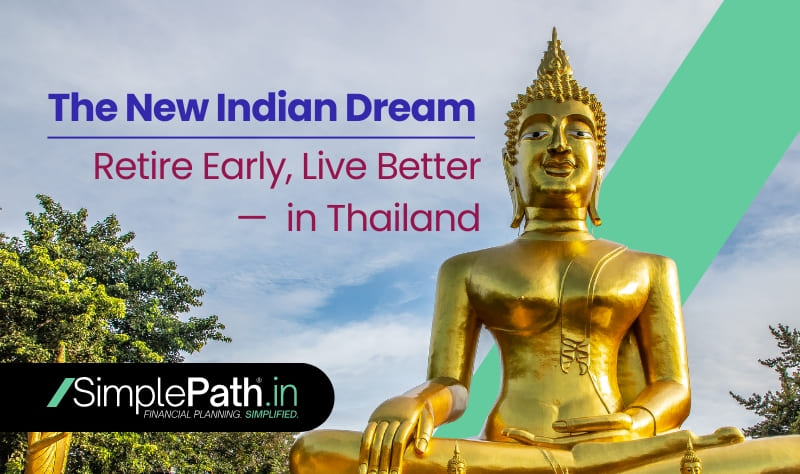As the stress of urban life and long corporate careers begins to take its toll, a surprising number of Indian couples in their 50s are charting a new path — not toward the sleepy suburbs of Mumbai or Delhi, but to the serene towns of Thailand. Trading traffic jams for tropical tranquility, they’re finding a way to retiring in Thailand, without compromising on lifestyle.
This isn’t just a passing trend. It’s part of a larger movement — a redefinition of what retirement looks like for modern Indians.
🌏 Why Retire in Thailand? The Practical and Emotional Appeal
Sarthak Ahuja, an investment banker, recently spotlighted this emerging trend on LinkedIn, noting a 25% rise in Indian retirees moving to Thailand over the past three years.
For Indian couples in their 50s contemplating early retirement, Thailand is emerging as more than just a holiday destination. It’s becoming a lifestyle upgrade — a place where affordability meets quality of life, and calm replaces chaos. Here’s why this Southeast Asian nation is striking a chord with the Indian middle and upper-middle class, especially those burnt out from decades of corporate hustle.
✅ 1. Lower Cost of Living
The cost of living in many Thai cities is 30–40% lower than in Indian metros like Mumbai, Delhi, or Bengaluru. Whether it’s rent, groceries, eating out, domestic help, or transport — your monthly budget stretches further in Thailand. If retiring in Thailand, retired couples can enjoy a more spacious home, eat out more frequently, and access better infrastructure without compromising their savings.
Example: A modern 2BHK apartment in Chiang Mai rents for ₹45,000–₹55,000 a month, compared to ₹1 lakh+ for a similar property in South Mumbai or Gurgaon.
✅ 2. World-Class Healthcare at a Lower Cost
Thailand is internationally recognized for its high-quality medical infrastructure. Private hospitals in cities like Bangkok, Chiang Mai, and Hua Hin are equipped with state-of-the-art technology and internationally trained doctors. Health services are 25–30% cheaper than in India, and health insurance for retirees is both affordable and accepted across many hospitals.
Bonus: Thailand is a hub for medical tourism, so elective surgeries, dental care, or wellness treatments are of high quality and relatively inexpensive.
✅ 3. Proximity and Time Zone Convenience
Thailand is just a 3.5–4.5 hour flight from major Indian cities and has only a 1.5-hour time difference with IST. This makes it incredibly easy to stay connected with family in India or even continue remote work or consulting roles for Indian clients without the inconvenience of late-night calls or jet lag.
✅ 4. Retirement-Friendly Visa Policies
The Thai government actively supports retirees through its Retirement Visa program (Non-Immigrant O or O-A), which allows long-term stays for foreigners over the age of 50, with relatively straightforward financial criteria and annual renewals.
You need to show a monthly income of ₹1.5 lakh or maintain ~₹20 lakh in a Thai bank account — reasonable for upper-middle-class Indian retirees.
✅ 5. Well-Connected Expat Communities
Cities like Chiang Mai, Hua Hin, and even parts of Bangkok have established Indian and global expat communities. You’ll find Indian restaurants, cultural events, yoga centers, spiritual retreats, and English-speaking doctors, lawyers, and service providers — making the transition easier and more comfortable.
💰 Costs Comparision Behind the Relocation to Thailand: Rupees to Baht
Here’s how this Geoarbitrage plays out:
- Rent Comparison:
- Mumbai/Delhi 2BHK: ₹1 – 1.2 lakh/month
- Chiang Mai 2BHK: ₹45,000 – ₹55,000/month
- Living Expenses:
- Day-to-day costs (groceries, transport, dining) are about 30-40% lower in Thailand.
- Healthcare:
- Quality medical care is easily accessible and up to 25% more affordable.
- Remote Working:
- With minimal time difference and excellent internet connectivity, many retirees continue working or consulting for Indian clients.
🏡 Thai Cities to Consider Retiring In
| City | Lifestyle | Cost | Healthcare | Best For |
|---|---|---|---|---|
| Chiang Mai | Cultural, calm | Low | Excellent | Balanced living, walkability |
| Hua Hin | Beach + wellness | Medium | Very good | Golf lovers, peaceful retirees |
| Chiang Rai | Quiet, scenic | Very low | Basic | Minimalists, nature seekers |
| Koh Samui | Tropical island life | Medium | Good | Beach + yoga enthusiasts |
| Pai | Bohemian mountain town | Very low | Limited | Creative, offbeat souls |
| Bangkok | Urban, vibrant | High | World-class | City lovers, hospital access |
| Krabi/Phuket | Nature + tourism | Medium | Very good | Sea lovers, outdoor explorers |
📋 Retirement Visa: What You Need to Know for Retiring in Thailand
For Retiring in Thailand, Thailand offers a Retirement Visa (Non-Immigrant O or O-A) designed for retirees aged 50 and above.
✅ Requirements:
- Age: 50+
- Clean criminal record
- Financial eligibility (choose one):
- THB 800,000 (~₹18–20 lakh) in a Thai bank
- Monthly pension/income of THB 65,000 (~₹1.5 lakh)
- Combination of bank balance and income
🏦 Additional Requirements:
- Valid health insurance
- Proof of Thai address (rental agreement or owned property)
- Annual reporting to Thai immigration (“90-day reporting”)
- Visa is renewable yearly
⛔ Permanent Residency:
- Rarely pursued by retirees due to complex requirements like Thai proficiency, income from local sources, and multi-year residence.
🧠 The Emotional Side: Are You Ready for Retiring in Thailand?
While the financials are compelling, emotional readiness is equally important while considering retiring in Thailand.
👨👩👧 Children May Not Be Fully Independent
- Many Indian couples in their 50s still have children pursuing higher education or launching careers.
- Emotional support roles are still active, especially in joint family cultures.
- Missing family events or festivals can lead to emotional strain.
🌍 Cultural & Social Considerations
- Language and cultural differences may take time to adapt to.
- Social circles need rebuilding in a new environment.
- Homesickness and a longing for familiar routines can be real challenges.
🚪 Transition Strategies:
- Trial stays of 3-6 months
- Split year living (e.g., 6 months in Thailand, 6 in India)
- Staying connected digitally through frequent calls, video chats, and visits
🍍 Retirement Is Not Slowing Down — It’s Reinvention
The traditional Indian notion of retirement — a phase marked by withdrawal, rest, and quiet domesticity — is quietly being rewritten by a new generation of financially independent couples in their 50s. For these urban professionals who’ve spent decades in demanding jobs, retirement is no longer an “end.” It’s a redefinition of life’s pace, purpose, and possibilities.
And for many, that redefinition is happening not in a suburb of Pune or Coimbatore — but in the quiet lanes of Chiang Mai, the beaches of Hua Hin, or the cultural centers of Udon Thani.
Here’s how this new-age retirement is less about slowing down — and more about reinventing yourself.
👩💼 1. Doing Less Stressful, More Meaningful Work
Many retirees aren’t giving up work — they’re simply changing its form and intensity.
After decades in full-time corporate roles, they’re shifting to:
- Freelance consulting in their domain of expertise
- Mentorship roles with startups or nonprofits
- Remote work for Indian clients (thanks to the manageable time zone)
- Passion projects like writing, design, or teaching online
This allows them to stay mentally engaged, financially active, and emotionally fulfilled — without the grind of long hours, office politics, or rigid schedules.
💬 “I don’t want to stop working — I just want to stop hustling. In Thailand, I work 15 hours a week doing what I love — and spend the rest of the time living.” — a semi-retired IT consultant from Pune now based in Chiang Mai.
🧘♂️ 2. Embracing Wellness as a Daily Practice, Not an Occasional Escape
Retirement abroad, especially in wellness-oriented countries like Thailand, enables people to embed self-care into their lifestyle. It’s not about planning an annual yoga retreat — it’s about making well-being a part of everyday life.
Common lifestyle upgrades include:
- Daily morning walks in nature (by the river, in the hills, or along the beach)
- Affordable access to massages, spas, and traditional therapies
- Easy availability of fresh, organic food and clean air
- Practicing yoga, tai chi, or meditation in community parks or local studios
The rhythm of life in Thai towns naturally encourages slow living — not as a retreat from ambition, but as a shift toward sustainable joy.
☮️ 3. Prioritizing Peace of Mind Over Prestige
In Indian metros, retirement often gets tangled with anxiety about relevance — “What will people think if I’m not working?” or “How can I maintain my lifestyle and status?”
Abroad, especially in a non-judgmental culture like Thailand’s, retirees often rediscover the freedom to live without comparison.
- There’s no pressure to impress neighbors with cars or club memberships.
- There’s no invisible race for prestige or social dominance.
- People pursue happiness on their own terms — not as defined by LinkedIn or extended family WhatsApp groups.
This liberation from social expectation enables deeper self-discovery and contentment.
🧘♀️ “We went from gated society gossip to greeting monks on the street. From home loans to hammock naps. That’s the real upgrade.” — A former marketing head now writing poetry from Krabi.
🌏 4. Redefining Wealth as Time, Health, and Freedom
For many couples, the move abroad is also symbolic. It’s a way of saying, “We’ve worked hard, saved smart — now it’s time to use that wealth to buy time, not things.”
This shift reframes retirement as:
- Time wealth: Waking up without an alarm clock, exploring local cafés, pursuing forgotten hobbies
- Health wealth: Prioritizing fitness, preventive care, mental well-being
- Freedom wealth: Choosing how you spend your day, where you live, and what you do
When these become the currency of retirement, life feels richer — even if bank balances remain the same.
🎯 Reinvention, Not Retreat
This isn’t about running away from something. It’s about moving toward something better:
- A lifestyle that aligns with your values.
- A pace that allows you to breathe.
- A routine that leaves space for joy.
For Indian couples who’ve spent 25+ years juggling deadlines, dependents, and Delhi traffic, this isn’t escapism — it’s evolution.
🎯 Is This Move Right for You? Key Questions to Ask Before Retiring in Thailand
- Do I have enough financial security for 20-30 years?
- Are my children (or parents) emotionally and financially stable?
- Am I adaptable to a different culture and climate?
- Can I manage income sources or retirement corpus efficiently?
- Am I okay being physically distant from social and family events?
📌 Final Thoughts on Retiring in Thailand: From Rat Race to Peaceful Innings
This movement isn’t just about Thailand. It’s about challenging the default narrative of retirement. It’s about:
- Living where you feel most at peace
- Making your retirement corpus work smarter
- Creating a second innings that’s joyful, vibrant, and aligned with your values
The new Indian dream might just be this:
Earn in Rupees. Live in Baht. Retire with balance.
📞 Need Help Planning Your Retirement?
At Simple Path, we specialize in helping clients plan not just financially secure retirements but deeply fulfilling ones. If Thailand or any overseas retirement destination is on your radar, speak to us about building a globally viable retirement plan tailored to your goals.



